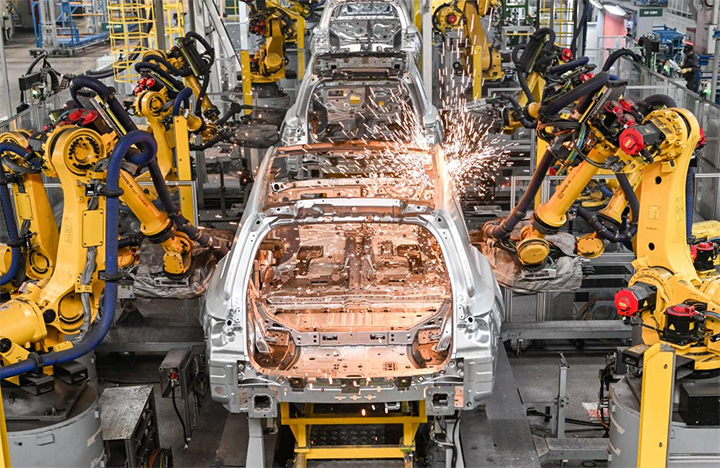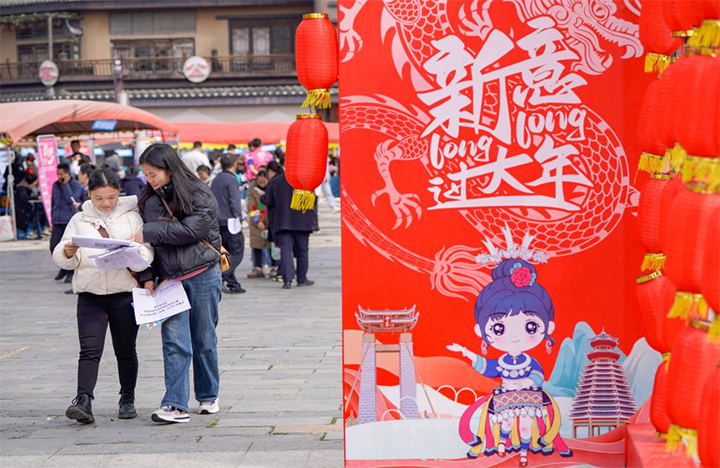


The Second Session of the 14th National People's Congress (NPC) commenced in Beijing on May 5, drawing global attention. The Government's work report highlighted China's notable economic recovery and improvement over the past year. The gross domestic product surpassed 126 trillion yuan, reflecting a 5.2% increase, positioning China's growth rate among the world's major economies.
The international community widely acknowledges China's economic achievements as hard-earned and remarkable in the face of various intertwined and superimposed difficulties and challenges. The fundamental trajectory of China's economic recovery and sustained improvement remains unchanged and is expected to persist. China is actively implementing the new development concept, expediting the establishment of a novel development pattern, and holistically advancing Chinese-style modernization through high-quality development. This commitment will undoubtedly contribute to its internal progress, regional prosperity, and the ongoing global economic recovery.

This is a view of Xi'an's Datang Everbright City taken on Feb 2, 2024 (drone photo). [Photo by Shao Rui from Xinhua]
Rebounding and Resilient
"The entire world eagerly anticipates China's progress in 2024," remarked Fernando Lugris, Uruguay's ambassador to China, during a recent media interview. He emphasized China's pivotal role as a key driver of global economic growth and its consistent position as Uruguay's largest trading partner for over a decade. Expectations are high regarding both the speed and quality of China's economic development.
In 2023, China's exports of electric vehicles, lithium batteries, and photovoltaic products, collectively referred to as "the new three," surpassed one trillion yuan. This achievement underscores China's ongoing optimization of economic structure and successful transformation, indicative of a commitment to quality enhancement. Professor Hayley Tuerk from the Illinois Institute of Technology observed that China is transitioning from its previous emphasis on rapid and extensive growth to a focus on high-quality development. Notably, the green transformation has emerged as a new driving force for China's economic progress.
Over the past year, the global economy has grappled with a dearth of growth momentum, compounded by the frequent emergence of regional hotspot issues, escalating the complexity, severity, and uncertainty of the external environment. Concurrently, China's economy encountered numerous challenges amid its ongoing efforts to rebound and improve. Confronted with a severe and intricate situation, China's economy not only withstood the pressure but also intensified macro-control measures, consistently enhancing its economic performance.
Upon comprehensive analysis and assessment, it becomes evident that China's development confronts an environment where strategic opportunities, risks, and challenges coalesce. However, the balance tips in favor of favorable conditions outweighing unfavorable factors. In response, numerous multinational enterprises have demonstrated their confidence by increasing investments and expanding production in China, strategically positioning themselves to partake in the dividends of China's high-quality development.
Liz Bettelson, Executive Director of the UK-China Business Association, highlighted China's standing as the world's second-largest economy, emphasizing the expanding size of the middle-income group. She noted, "Many British companies recognize the immense value of the Chinese market and are intensifying their efforts to cultivate their business in China."
According to the "China Business Climate Survey Report" released by the American Chamber of Commerce in China in February of this year, there is a positive outlook for the development prospects of U.S. enterprises in China in 2023. The survey reveals that 50% of the participating enterprises consider China as their world's first choice or one of the top three investment destinations. He Maike, President of the American Chamber of Commerce in China, conveyed to reporters that China's robust manufacturing and supply chain, coupled with its expansive consumer market, continue to be significant attractions for U.S. companies. He emphasized, "To maintain global competitiveness, it is essential for us to refine our strategies in the Chinese market."

On January 10th, a mechanical arm conducted welding operations in the workshop at Li Auto Inc. in Changzhou, Jiangsu Province. [photo by Ji Chunpeng from Xinhua]
The German Institute for Economic Research recently highlighted in a report that German direct investment in China reached a record-breaking 11.9 billion euros in 2023, marking a 4.3% increase from the previous year. Notably, German investment in China constituted 10.3% of Germany's total foreign investment for that year, reaching its highest level since 2014.
The enthusiasm among foreign enterprises for deepening their engagement in China remains unabated, contributing to structural shifts in foreign investment trends. Data from 2023 reveals that the actual utilization of foreign investment in China saw a notable surge in high-tech industries, accounting for 37.3% of total investments, a historic high. Within this category, high-tech manufacturing attracted a remarkable growth of 6.5%.
According to Lyudmila Veselova, Associate Professor at St Petersburg School of Economics and Management of the Higher School of Economics of the Russian State, China has recently implemented a series of policies aimed at optimizing the business environment for foreign enterprises. The country is actively addressing practical challenges faced by foreign businesses, while also actively attracting foreign investment, particularly in key sectors, promoting investment growth, expanding production, and establishing research and development centers in China. This proactive approach is anticipated to further unlock developmental potential.
Taking a long-term perspective, Dutch economist Heiko Ebers emphasizes that economic success is influenced by factors such as openness, education investments, competitiveness, infrastructure, innovation, and productivity growth. In recent years, China has consistently invested in these critical areas. He notes, "I am optimistic about China's long-term development."
Focusing on People's Livelihoods, Prioritizing People First
In recent days, overseas media attention on China's Second Session of the 14th NPC has continued to intensify. An opinion piece on South Korea's JoongAng Daily website asserts that a pivotal theme of this year's sessions in China is "high-quality development," emphasizing that "China's current objective is to enhance people's lives through high-quality development."

On February 19th, job seekers gathered at the "Spring Breeze Action" and East-West Labour Collaboration Job Fair in Wanda Town, Danzhai County, Qiandongnan Miao and Dong Autonomous Prefecture, Guizhou Province, to inquire about job opportunities. [Photo by Yang Shengxian from Xinhua]
The commitment to people-centered economic development in China extends beyond mere indicators, encompassing the broader spectrum of people's happiness and well-being, as highlighted by numerous international observers.
Anna Malimbog-Uy, Deputy Director of the Asian Century Institute of Strategic Studies in the Philippines, shared insights with reporters, underscoring that the people-centered development approach is deeply ingrained in Chinese history and culture. She emphasized that China's new development concept, characterized by innovation, coordination, green practices, openness, and sharing, reflects a commitment to sustainability and balance in economic development rather than a singular pursuit of speed.

On January 24th, workers were assembling vehicles on the production line at the Lima New Energy Electric Vehicle Industrial Park in Runan County, Henan Province. [Photo by Wu Gang from Xinhua]
Ali Raya, editor-in-chief of the Lebanese news website "China in the Eyes of Arabs," expresses that China's economy serves as a steady driving force for global economic growth. China has been adapting to the changing times and technological advancements, formulating a comprehensive plan for national economic and social development with the aim of enhancing the country's prosperity and the well-being of its people.
In 2023, there was a 6.1% growth in the per capita disposable income of the country's residents, leading to a continuous reduction in the income gap between urban and rural areas. Moreover, Chinese cities and towns generated 12.44 million new jobs, contributing to a generally stable employment situation. These achievements are particularly noteworthy considering the complex international environment and the demanding tasks of reform, development, and stabilization.
Charles Onunayiju, director of the Centre for China Studies in Nigeria, appreciates China's proficiency in using reform to address developmental challenges, bringing tangible benefits to its people. He sees this approach as a rational economic strategy coupled with a profound philosophical perspective. Onunayiju emphasizes that China's consistent economic progress has added stability to the world economy.
Croatian political analyst Krešimir Macan said that China's economy has overcome challenges and maintained steady growth, making a significant contribution to the global economy. China's model of development, centered on the well-being of its people, serves as an inspiring reference for other nations.
Win-Win Cooperation, Sharing Opportunities
China's development is intricately linked to the global landscape, and the world's prosperity is intertwined with China's success. China's steadfast commitment to high-quality development and continuous opening up to the global community has not only propelled its own economic progress but has also expanded the "cake" of global economic development, presenting mutual opportunities for cooperation on a global scale.
A prime example of the fruitful collaboration between China and Indonesia under the "Belt and Road" initiative is the Jakarta–Bandung High-Speed Railway. Having operated for over 140 days, this collaboration has facilitated transportation for more than 2 million passengers, offering a new transportation option between Indonesia's capital, Jakarta, and the renowned tourist city of Bandung.
"Indonesia stands as one of the beneficiaries of the 'Belt and Road' initiative, with the Jakarta–Bandung High-Speed Railway serving as a notable success story of our collaboration," remarked Bala Mamia, a senior economist at Bank Central Asia, Indonesia's largest private bank. He expressed to reporters that the 'Belt and Road' initiative is pivotal in transforming and upgrading Indonesia's economy, benefiting both industrial production and trade.

On March 3rd, a child charmingly posed for a photo beside a model of the Jakarta–Bandung High-Speed Railway at the waiting hall of Halim Station in Jakarta, Indonesia. [Photo by Xu Qin from Xinhua]
Over the past decade since the inception of the “Belt and Road” initiative, a multitude of projects have taken root, forging a path of cooperation, opportunity, and prosperity, leading to shared development. It has emerged as the world's most sought-after international public initiative and the largest international cooperation platform.
In 2023, China's annual import and export of goods reached RMB 41.76 trillion, marking a 0.2% increase from the previous year. Import and export activities with Belt and Road countries grew by 2.8%, constituting 46.6% of the total import and export value.
From the China-Egypt TEDA Suez Economic and Trade Cooperation Zone to the Central Business District of the new administrative capital and then to the ultra-high complex project of Alamein new city, the collaboration between Egypt and China has yielded a myriad of achievements in recent years, as highlighted by Egyptian Professor Nasser Abdel-Aller of Chinese Language and Culture at the Ain Shams University. Abdel-Aller attributes these successes to China's commitment to the concept of win-win cooperation and common development, providing a unique perspective for countries to advance their economies.
Speaking on China's global engagement, Abdel Al noted China's active leadership or participation in initiatives such as the Asian Infrastructure Investment Bank and the BRICS mechanism, opening new horizons for the development of countries in the global South and making significant contributions to the global economy.
Muthana Mazrui, a professor of political geography at Tikrit University in Iraq, described the Chinese government's initiatives like the Belt and Road as "another great opening up" for China to the world. He emphasized that these initiatives contribute Chinese wisdom to the development of the global economy and trade, bringing a broad spectrum of positive impacts to the world economy and trade. (Reported by Xinhua's foreign correspondents, written by Su Liang, Yu Rong, and Yan Jie)
Source: <https://www.yidaiyilu.gov.cn/p/0MQDF3L1.html>
Translated by Chen Xiao